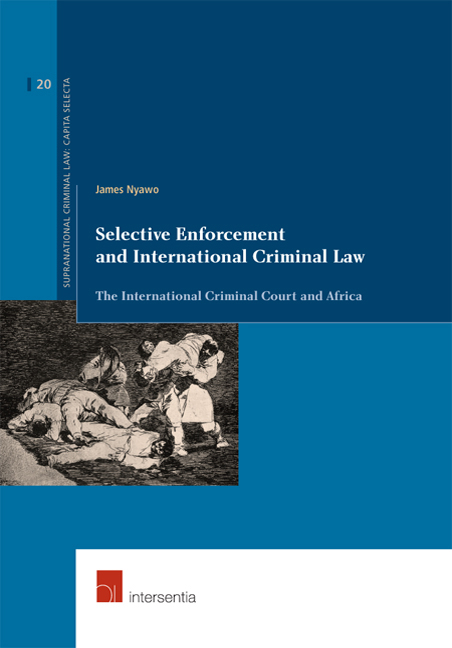Book contents
- Frontmatter
- Dedication
- Preface
- Acknowledgements
- Contents
- Epigraph
- Chapter 1 Introduction
- Chapter 2 The Establishment of the International Criminal Court, and Africa's Role and Early Support
- Chapter 3 The Office of the Prosecutor and the Politics of Selecting Targets for Prosecution
- Chapter 4 State Party Referrals, UN Security Council Referrals and the Selection of Situations
- Chapter 5 Assessing Selective Enforcement from an Admissibility Perspective
- Chapter 6 The AU and African States’ Shift from Cooperation to Non-Cooperation with the Court
- Chapter 7 African States’ Reaction to the AU's Call for Non-Cooperation with the Court
- Chapter 8 Africa and the International Criminal Court: The Lessons and Prospects
- Bibliography
- Index
Chapter 3 - The Office of the Prosecutor and the Politics of Selecting Targets for Prosecution
Published online by Cambridge University Press: 25 September 2018
- Frontmatter
- Dedication
- Preface
- Acknowledgements
- Contents
- Epigraph
- Chapter 1 Introduction
- Chapter 2 The Establishment of the International Criminal Court, and Africa's Role and Early Support
- Chapter 3 The Office of the Prosecutor and the Politics of Selecting Targets for Prosecution
- Chapter 4 State Party Referrals, UN Security Council Referrals and the Selection of Situations
- Chapter 5 Assessing Selective Enforcement from an Admissibility Perspective
- Chapter 6 The AU and African States’ Shift from Cooperation to Non-Cooperation with the Court
- Chapter 7 African States’ Reaction to the AU's Call for Non-Cooperation with the Court
- Chapter 8 Africa and the International Criminal Court: The Lessons and Prospects
- Bibliography
- Index
Summary
The Chief Prosecutor of the Court heads the Office of the Prosecutor and is elected by the Assembly of States Parties for a nine-year term; the first to hold the office was Argentine lawyer Luis Gabriel Moreno Ocampo (2003 – 12). Initially Moreno Ocampo was nominated by the US to be the chief prosecutor for the International Criminal Tribunal for the former Yugoslavia. The Argentine government opposed him because at the time of his nomination, he belonged to the opposition party. In 2011, the Assembly of States Parties unanimously elected Moreno Ocampo's deputy, Fatou Bensouda, a Gambian lawyer, to take over from her former boss.
The Office of the Prosecutor is responsible for receiving referrals and any substantiated information on crimes within the jurisdiction of the Court, before examining them for conducting investigations and prosecutions before the Court. Its role is also to initiate investigations proprio motu, on the basis of information on crimes within the jurisdiction of the Court, and this role is subject to judicial review by the Pre-Trial Chamber. Article 53(1) states that the Office of the Prosecutor shall, having evaluated the available information, initiate an investigation unless it determines that there is no reasonable basis upon which to proceed under the Statute. The underlying assumption is that once a situation has been triggered by either a state party or the UN Security Council, the Chief Prosecutor is obliged to initiate an investigation and prosecution.
The factors that the Office of the Prosecutor has to consider when determining whether or not to open investigations are: (a) whether there is a reasonable basis to believe that a crime within the jurisdiction of the Court has been, or is being, committed; (b) whether the case is, or would be, admissible under Article 17; and (c) the gravity of the crime, the interests of victims and whether there are substantial reasons to believe that an investigation would not serve the interests of justice. These factors constitute the legal framework that the Office of the Prosecutor is expected to apply during its preliminary examinations.
- Type
- Chapter
- Information
- Selective Enforcement and International Criminal LawThe International Criminal Court and Africa, pp. 57 - 96Publisher: IntersentiaPrint publication year: 2017



